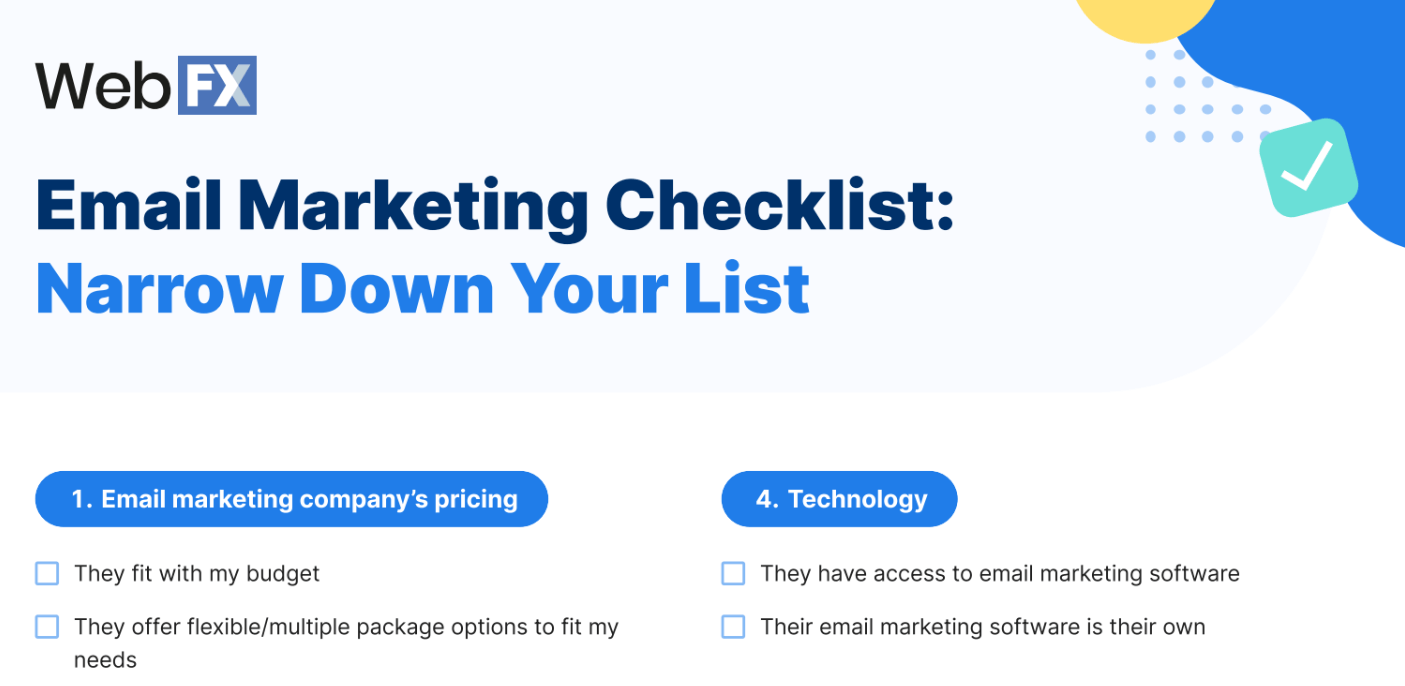-
 Published: Nov 3, 2025
Published: Nov 3, 2025
-
 10 min. read
10 min. read
-
Summarize in ChatGPT
-
 Emily Carter, M.S.
Emily Carter, M.S. Sr. Content Team Lead
Sr. Content Team Lead
- Emily Carter is the Sr. Content Team Lead at WebFX, where she leads the creative team behind the company’s website, blog, and email campaigns. With an M.S. in Digital Marketing and 10+ years of experience, she’s written and reviewed hundreds of articles on marketing, SEO, and tech, helping businesses turn complex topics into actionable strategies. Her work appears across WebFX and its brands, including SEO.com, Nutshell, and TeamAI, and has been featured by Social Media Today, HuffPost, and more. Outside the office, she’s usually road-tripping, hiking, or planning her next national park adventure. @emcarter16
Table of Contents
- 5 benefits of outsourcing email marketing
- When to outsource email marketing: Key decision points
- How to outsource email marketing
- 1. Get clear on your scope, budget, and email goals
- 2. Decide what type of email marketing provider you need
- 3. Prioritize email providers that focus on bottom-line impact
- 4. Choose an email provider that can seamlessly integrate with your tech stack
- 5. Evaluate email pricing and deliverables
- 6. Look for proof like case studies and testimonials
- 7. Request your custom email proposal and ask for demos
- 8. Finalize your selection and contract
- 🚩 Email marketing agency red flags
- Outsource email marketing with confidence — powered by strategy and software
- Email Marketing Outsourcing FAQs: When, why, and how to get the help you need
- How much does it cost to outsource email marketing?
- What are the benefits of outsourcing email marketing?
- How do I choose the right email marketing agency?
- Can outsourcing email marketing improve ROI?
- Is it better to outsource or keep email marketing in-house?
- What tasks can I outsource to an email marketing service provider?
- How can I monitor the performance of my outsourced email marketing campaign’s performance?
- Why should I consider outsourcing email marketing? Outsourcing can be cost-effective for businesses. It provides access to professional expertise and robust marketing tools, enabling you to deliver scalable strategies.
- How do you choose the right email marketing provider? Define your scope and budget first, then evaluate providers based on their ability to drive bottom-line impact, seamless tech stack integration, transparent pricing with clear deliverables, proven case studies with measurable results, and customized proposals that address your specific business goals.
Email marketing is one of the highest ROI channels out there — generating an average of $36 for every $1 spent. But building a strategy that actually performs takes time, tools, and expertise.
If you’re like many growing businesses, email falls off the radar or gets rushed out with little impact. You know it matters, but finding the time or in-house skill to do it right isn’t easy.
That’s where outsourcing comes in. The right partner brings strategy, content, design, and automation — without the overhead of building it all yourself.
In this guide, we’ll show you the following:
- The benefits of outsourcing email marketing
- When to outsource email marketing
- How to choose the right provider
- Email marketing agency red flags
- FAQs about outsourcing email
Download Now: Email Marketing Checklist for Outsourcing Email
5 benefits of outsourcing email marketing
- Lower overhead than hiring in-house: Outsourcing eliminates the need to hire, train, and manage a full-time email team. You get access to experienced strategists, designers, and copywriters — without the ongoing salary, benefits, and management costs.
- Save money on tools and technology: Agencies often have access to premium email platforms, testing tools, and automation software (tools that could cost you hundreds or thousands per month if purchased separately). You get the benefits without the extra subscription fees.
- Faster results, less trial-and-error: An experienced agency brings proven strategies, templates, and A/B testing frameworks to the table, helping you skip the guesswork and start seeing ROI sooner.
- Stronger campaign performance through ongoing optimization: Agencies analyze your audience, segment your lists, and continuously optimize subject lines, send times, and CTAs — leading to higher open rates, more clicks, and better conversions.
- Scalable support as you grow: As your business and list size expand, an agency can scale your email efforts without you having to build additional internal resources. That means you can increase frequency, complexity, and personalization — all without slowing down.
When to outsource email marketing: Key decision points
Not sure if outsourcing is the right move? Weigh your options based on your team’s resources, goals, and current performance.
Use the following key points to guide you:
| Outsource Email If: | Keep Email In-House If: |
| You lack experienced email strategists, copywriters, or designers. | You have a skilled in-house team that consistently delivers results. |
| Your team is stretched thin and can’t prioritize email marketing. | You have dedicated team members with capacity to manage campaigns. |
| Open rates, click-throughs, or conversions are underperforming. | Your current strategy is meeting or exceeding performance goals. |
| You’re paying for multiple email marketing tools or not using advanced features effectively. | You already have martech stack dialed in and are seeing strong ROI. |
| Your list isn’t growing, or you’re not segmenting for targeted sends. | You have clear audience segments and an active, engaged list. |
| Campaigns go out sporadically or get delayed due to other priorities. | You consistently send timely, well-executed campaigns. |
| You want to ramp up frequency, personalization, or automation — fast. | Your current process can scale without losing quality or momentum. |
| You have the budget to invest in experts services for long-term ROI. | You’re on a tight budget and can maintain results internally. |
How to outsource email marketing
Choosing the right email marketing provider isn’t just about outsourcing work — it’s about finding a partner who can drive results without draining your budget.
Below are eight key steps to help you evaluate providers with confidence, from pricing and platforms to strategy and fit.
8 Steps for Outsourcing Email
- Get clear on your scope, budget, and email goals
- Decide what type of email provider you need
- Prioritize email providers that focus on bottom-line impact
- Choose an email marketing provider that can seamlessly integrate with your tech stack
- Evaluate email pricing and deliverables
- Look for proof like case studies and testimonials
- Request your custom email proposal and ask for demos
- Finalize your selection and contract
1. Get clear on your scope, budget, and email goals
Before you compare providers, define what you actually need help with.
- Level of support needed: Decide whether you need full-service help (strategy, copy, design, automation) or just executional support like writing or scheduling.
- Primary email goals: Clarify your top priorities — whether it’s nurturing leads, increasing ecommerce sales, or re-engaging inactive subscribers.
- Email volume: Estimate how many emails you plan to send per month to ensure potential partners can handle the workload.
- Budget range: Set a realistic monthly or project-based budget so you can quickly rule out providers that are too costly (or too bare-bones).
- Internal resources: Consider what your team can realistically manage in-house vs. what needs to be handed off completely.
Getting clear on these points will help inform which providers are a good fit from the start.
2. Decide what type of email marketing provider you need
When it comes to email management, there’s a spectrum of options: Freelance email specialists, marketing consultants, boutique agencies, and full-service digital firms.
Freelancers may be more affordable but lack strategic depth or scalability. Larger agencies bring more resources but can come with higher minimums or longer ramp-up times. Choose based on your complexity, internal capacity, and need for strategic guidance vs. tactical support.
Here are some key points to consider when deciding what type of email provider is best for you.
| Provider Type | Best For | Pros | Cons |
| Freelance Email Specialist | Small businesses or one-off projects with limited scope | Affordable, flexible, often skilled in one area (copy, design, or platform setup) | May lack strategic oversight, limited availability, can’t scale easily |
| Marketing Consultant | Businesses that need high-level strategy without full execution | Offers strategic insight, audits, and direction without committing to long-term execution | Doesn’t typically handle campaign production or ongoing management |
| Boutique Email Agency | Mid-size businesses wanting personalized service and full campaign support | Balanced pricing, hands-on support, creative and strategic services in one place | May have limited bandwidth for larger or rapidly scaling accounts |
| Full-Service Digital Agency | Companies looking to integrate email into a broader marketing strategy | Cross-channel expertise, deep resources, dedicated teams, scalability | Higher cost, longer onboarding, may not be ideal for email-only needs |
3. Prioritize email providers that focus on bottom-line impact
The right partner should go beyond design and delivery. They should build strategies that directly impact your bottom line.
Look for providers who can map email campaigns to key stages in your customer journey, create high-converting automations, and back their approach with real data. If they can’t speak clearly about how they’ll help you increase revenue, retention, or customer lifetime value, keep looking.
4. Choose an email provider that can seamlessly integrate with your tech stack
Your email strategy shouldn’t operate in a silo. It should work hand-in-hand with your customer relationship management platform (CRM), ecommerce platform, and customer data.
Look for providers who understand how to connect email with your broader marketing stack and can integrate seamlessly with your CRM or custom tech stack.
The best partners will not only work within your systems, but help you unlock hidden value through smarter automations, deeper segmentation, and personalized campaigns powered by real-time data.
5. Evaluate email pricing and deliverables
Email marketing providers use different pricing structures — from per-campaign rates to monthly retainers or performance-based fees.
Don’t just compare price tags. Dig into what’s actually included, such as:
- Strategy
- A/B testing
- List management
- Reporting
- Design revisions
Be cautious of vague scopes and low-cost offers that seem too good to be true. Quality email marketing that drives revenue is an investment, and cutting corners often costs more in the long run.
Here are a few key things to think about when it comes to email pricing.
| Pricing Model | Typical Cost Range | Best For |
| Per Campaign | $500 – $3,000+ per campaign | One-off campaigns, seasonal promos, small businesses |
| Monthly Retainer | $1,000 – $7,500+/month | Businesses needing consistent email execution and growth |
| Hourly | $50 – $200+/hour | Project-based support or occasional consulting |
| Performance-Based | Commission or % of revenue (5–20%) | Ecommerce or high-volume businesses focused on ROI |
| Project-Based (One-Time) | $1,500 – $10,000+ | Redesigns, audits, or setup work without ongoing commitment |
| Freelancer (Per Email) | $100 – $500/email | Budget-conscious teams needing occasional sends |
6. Look for proof like case studies and testimonials
Anyone can promise results — the best agencies prove them. Dig into case studies that show how they’ve improved open rates, driven revenue, or helped clients scale. Look for specifics: What were the goals? What actions did the agency take? What measurable outcomes did they deliver?
Also, scan reviews and testimonials for red flags like poor communication or missed deadlines. Bonus points if you can speak directly to a past or current client. A credible provider should be proud to share success stories that align with your goals.
7. Request your custom email proposal and ask for demos
Once you’ve narrowed down your shortlist, ask each provider for a tailored proposal, not just a generic service list.
A strong proposal should clearly outline:
- How they’ll approach your business goals
- What deliverables are included (and how often)
- Pricing structure
- Timelines
- ROI reporting
This is your chance to see how well they understand your business and whether they’re bringing fresh, strategic ideas to the table.
If the provider uses proprietary tools or custom dashboards, ask for a demo. Whether it’s reporting software, list segmentation tools, or automation frameworks, you want to know what tech you’ll have access to and how it fits into your current workflow.
The best agencies won’t just pitch their services. They’ll show you exactly how their systems and solutions can make your life easier and your email campaigns more effective.
8. Finalize your selection and contract
Once you’ve compared proposals, seen a demo (if applicable), and asked your key questions, it’s time to make your pick.
Choose the provider that not only fits your budget and goals, but also feels like a collaborative, proactive partner, not just a vendor. Look for signs they understand your business, offer strategic value, and have a clear plan to drive measurable results.
Before signing, review the contract closely. Make sure deliverables, timelines, communication expectations, and exit terms are clearly defined. Clarify how revisions, reporting, and scope changes will be handled. A well-structured agreement protects both sides and sets the tone for a successful, long-term partnership.
🚩 Email marketing agency red flags
Even the most polished pitch can hide signs of a poor fit. Watch for these common red flags that signal an email marketing agency or provider might not deliver the results you’re looking for:
- Generic strategy: If they can’t clearly explain how they’ll tailor your email campaigns to your business goals, you’re likely getting a one-size-fits-all approach.
- No track record of revenue impact: Providers that focus only on vanity metrics (like open rates) without tying their work to conversions or ROI should raise concern.
- Limited platform knowledge: If they fumble through questions about your email platform or CRM, they may not be equipped to fully leverage your tech stack.
- Slow or surface-level communication: Delayed responses or overly high-level answers during the vetting process often lead to frustrating collaboration later on.
- Lack of reporting transparency: If they can’t show you past results or provide a sample report, it’s a sign they may not prioritize data or accountability.
Email marketing outsourcing FAQs: When, why, and how to get the help you need
How much does it cost to outsource email marketing?
The cost varies depending on the scope and complexity of services. On average, businesses might spend around $51 – $1,000 per month when working with an agency.
What are the benefits of outsourcing email marketing?
Outsourcing can be cost-effective, save time, provide access to professional expertise, offer cutting-edge marketing technology, and deliver scalable strategies.
How do I choose the right email marketing agency?
Evaluate an agency’s services, analyze their portfolio, compare pricing models, consider their email marketing software expertise, and ask relevant questions to ensure they align with your business goals.
Can outsourcing email marketing improve ROI?
Yes. By leveraging the expertise of specialized agencies, businesses can craft more effective campaigns, leading to better engagement and increased revenue.
You can calculate your ROI from email marketing with these steps:
- Choose the period you want to calculate your ROI.
- Identify your email marketing spending for the period. It can include your email service provider’s fees.
- Compute your ROI with this formula:
ROI = total earnings from email / total spending on email
You can also use our free ROI calculator:
Is it better to outsource or keep email marketing in-house?
Outsourcing provides access to specialized skills and can be more cost-effective, especially for small businesses without dedicated marketing teams. However, keeping it in-house offers more control over campaigns. The decision depends on your company’s resources and marketing objectives.
What tasks can I outsource to an email marketing service provider?
You can outsource a wide range of tasks to an email marketing service provider, from crafting your strategy and building your email list to running campaigns and analyzing performance.
Typically, full-service digital marketing agencies and dedicated email marketing providers can do everything for you. However, you can opt to outsource tasks that you only need help with, such as:
- Strategy and planning: This step involves crafting your overall email marketing program. It may involve setting goals, competitive analysis, and auditing your list and current campaigns.
- Content development and design: You can also outsource copywriting, graphic design, and email layout to your email marketing agency.
- Campaign management: If you need help with A/B testing, scheduled send-outs, and creating email drip campaigns, you can also outsource these tasks to your agency.
- Tracking and analytics: Email marketing service providers have tools to track and measure your campaigns’ success. They can monitor your emails’ open rates, click-through rates, and conversion rates, and generate reports that analyze your campaign performance. They can also create custom dashboards for your team.
How can I monitor the performance of my outsourced email marketing campaign’s performance?
Tracking your email marketing campaign’s performance is crucial, because you need to know if you’re getting returns from your investment.
To measure performance, you must define your goals and KPIs at the start of your engagement with your provider. Ask your email marketing service provider to give you monthly reports on key metrics, such as the following:
- Open rates
- Click-through rates
- Conversion rates
- Bounce rates
Have monthly catchups with them to analyze your campaigns’ effectiveness and ROI. Identify what’s working and what’s not working, and next steps to ensure you’ll be on track to reach your goals.
Outsource email marketing with confidence — powered by strategy and software
When it comes to choosing an email marketing partner, you need more than just a service provider — you need a team that’s invested in your growth.
At WebFX, we combine award-winning strategy with powerful in-house tech like EmailMarketingFX, our proprietary email platform built to boost engagement, automate smarter, and drive real ROI. As a top U.S. email marketing agency, we’ve helped clients get a 14% average lift in sales from email — and we’d love to help you do the same.
Ready to turn your email list into a revenue-driving machine? Check out our email services and contact us online to speak with a strategist and see what’s possible with WebFX.
-
 Emily Carter is the Sr. Content Team Lead at WebFX, where she leads the creative team behind the company’s website, blog, and email campaigns. With an M.S. in Digital Marketing and 10+ years of experience, she’s written and reviewed hundreds of articles on marketing, SEO, and tech, helping businesses turn complex topics into actionable strategies. Her work appears across WebFX and its brands, including SEO.com, Nutshell, and TeamAI, and has been featured by Social Media Today, HuffPost, and more. Outside the office, she’s usually road-tripping, hiking, or planning her next national park adventure.@emcarter16
Emily Carter is the Sr. Content Team Lead at WebFX, where she leads the creative team behind the company’s website, blog, and email campaigns. With an M.S. in Digital Marketing and 10+ years of experience, she’s written and reviewed hundreds of articles on marketing, SEO, and tech, helping businesses turn complex topics into actionable strategies. Her work appears across WebFX and its brands, including SEO.com, Nutshell, and TeamAI, and has been featured by Social Media Today, HuffPost, and more. Outside the office, she’s usually road-tripping, hiking, or planning her next national park adventure.@emcarter16 -

WebFX is a full-service marketing agency with 1,100+ client reviews and a 4.9-star rating on Clutch! Find out how our expert team and revenue-accelerating tech can drive results for you! Learn more
Try our free Marketing Calculator
Craft a tailored online marketing strategy! Utilize our free Internet marketing calculator for a custom plan based on your location, reach, timeframe, and budget.
Plan Your Marketing Budget
Table of Contents
- 5 benefits of outsourcing email marketing
- When to outsource email marketing: Key decision points
- How to outsource email marketing
- 1. Get clear on your scope, budget, and email goals
- 2. Decide what type of email marketing provider you need
- 3. Prioritize email providers that focus on bottom-line impact
- 4. Choose an email provider that can seamlessly integrate with your tech stack
- 5. Evaluate email pricing and deliverables
- 6. Look for proof like case studies and testimonials
- 7. Request your custom email proposal and ask for demos
- 8. Finalize your selection and contract
- 🚩 Email marketing agency red flags
- Outsource email marketing with confidence — powered by strategy and software
- Email Marketing Outsourcing FAQs: When, why, and how to get the help you need
- How much does it cost to outsource email marketing?
- What are the benefits of outsourcing email marketing?
- How do I choose the right email marketing agency?
- Can outsourcing email marketing improve ROI?
- Is it better to outsource or keep email marketing in-house?
- What tasks can I outsource to an email marketing service provider?
- How can I monitor the performance of my outsourced email marketing campaign’s performance?

Proven Marketing Strategies

Proven Marketing Strategies
Try our free Marketing Calculator
Craft a tailored online marketing strategy! Utilize our free Internet marketing calculator for a custom plan based on your location, reach, timeframe, and budget.
Plan Your Marketing Budget
What to read next





